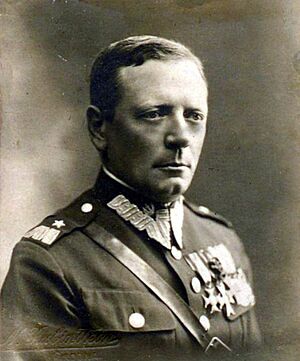Franciszek Kleeberg facts for kids
Quick facts for kids
Franciszek Kleeberg
|
|
|---|---|
 |
|
| Born | 1 February 1888 Tarnopol |
| Died | 5 April 1941 (aged 53) near Dresden |
| Buried |
Kock
|
| Allegiance | |
| Service/ |
|
| Years of service | 1914–1941 |
| Commands held | Independent Operational Group Polesie |
| Battles/wars | World War I Polish–Soviet War World War II *Battle of Kock |
| Awards | Virtuti Militari |
Franciszek Kleeberg was a brave Polish general. He was born on February 1, 1888, in Tarnopol and passed away on April 5, 1941, near Dresden. He fought in many wars, including World War I and World War II.
General Kleeberg is famous for leading the Independent Operational Group Polesie during the German Invasion of Poland in 1939. Even though his troops eventually ran out of supplies, he never lost a battle. He was a true hero for Poland.
Contents
Early Life and Military Training
Franciszek Kleeberg was born in 1888 in Tarnopol. At that time, Tarnopol was part of the Austro-Hungarian Empire. His family had German and Swedish roots. His father was an officer in the Austrian army. He had fought in a Polish uprising in 1863.
His father believed Poland would need good soldiers in the future. He hoped Franciszek would become one. Kleeberg went to military schools in Hranice and Mödling. He became a second lieutenant in the artillery. He also studied at a special military academy in Vienna.
A Career in the Military
Kleeberg started his military career in the Austro-Hungarian Army. In May 1915, he joined the Polish Legions in World War I. These legions were Polish military units that fought for Poland's independence.
After Poland became independent, Kleeberg joined the Polish Army. He commanded a regiment during the Polish–Soviet War from 1919 to 1921. In 1925, he studied at a French military school in Paris. Later, he became the commander of the Supreme Military School in Warsaw.
World War II and the Battle of Kock
When World War II began in September 1939, General Kleeberg was in charge of the IX Army Corps. This group was located in Brzesc, away from the main fighting. However, the war quickly changed. German forces advanced very fast, and there were many air raids.
By September 11, 1939, Kleeberg's corps became the Independent Operational Group Polesie. They did not have much heavy equipment. By September 14, they were already fighting against the German army. General Kleeberg bravely gathered scattered Polish units. He tried to break through to Warsaw, which was under siege.
After hearing that Warsaw had surrendered, Kleeberg's troops dug in. This led to the Battle of Kock. On October 5, 1939, General Kleeberg had to surrender. His forces had run out of ammunition and food.
Final Years and Legacy
After surrendering, General Kleeberg was taken as a prisoner of war. He was held in Oflag IV-B Koenigstein, a German prison camp. During his time there, he lost his eyesight and could no longer walk.
He passed away at the age of 53 in a hospital near Dresden on April 5, 1941. He was first buried there. In 1969, his remains were brought back to Poland. He was re-buried in Kock, among the soldiers he commanded.
Promotions and Awards
General Kleeberg earned many promotions and awards throughout his military career.
Promotions Earned
- Lieutenant – August 1908
- First Lieutenant – May 1913
- Captain – November 1915
- Major – August 1917
- Lieutenant Colonel – December 1918
- Colonel – April 1920
- Brigadier General – January 1928
- Major General – January 1943 (awarded after his death)
Military Awards Received
- Virtuti Militari (Poland's highest military honor)
- Polonia Restituta (a high Polish civilian and military award)
- Cross of Valour (awarded four times)
- Military Merit Medal (Austria-Hungary)
- Commander of the Légion d'honneur (France)
- Iron Cross of 1914, 2nd Class (Germany)
- Order of Lāčplēsis, 3rd Class (Latvia)
- Gold Cross of Merit (1937)
See also
- Battle of Kock
 | Audre Lorde |
 | John Berry Meachum |
 | Ferdinand Lee Barnett |

